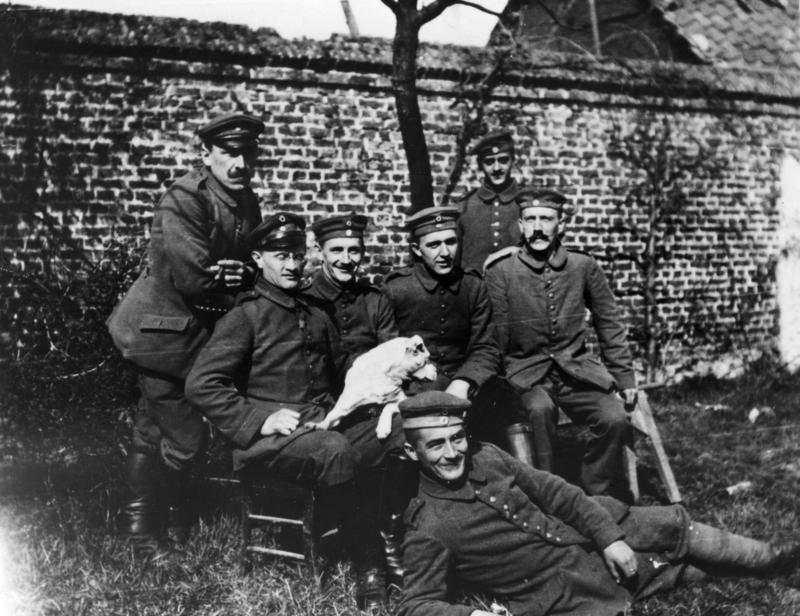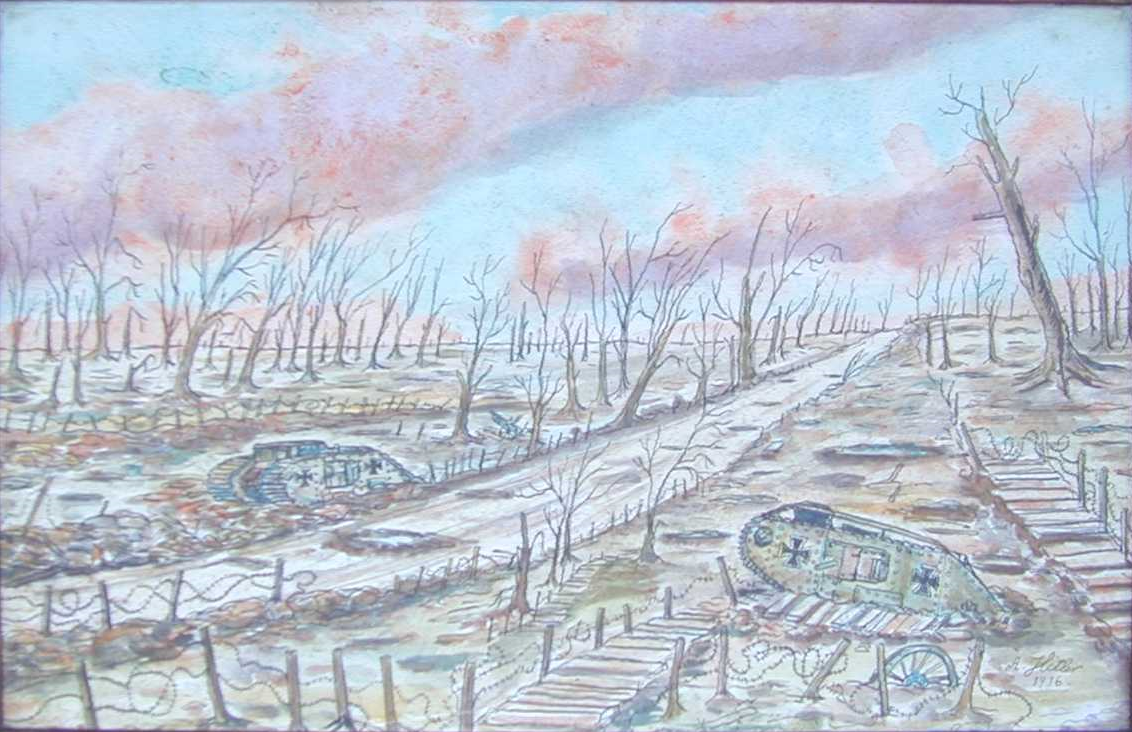- cross-posted to:
- history@hexbear.net
- cross-posted to:
- history@hexbear.net
There is a short way and a long way to explain this. The short way:
No other event in the twentieth century was more important to shaping Fascism than the First World War. I am not referring to the technologies, strategies, and aesthetics inherited from that conflict (though they did play a part), but to how it affected the petty bourgeoisie, leaving it feeling largely unrewarded, and thereby giving it new goals: most of the Fascists were petty bourgeois and fought in World War I. Why did the Fascists gain a reputation for being so obnoxiously strict? Because they inherited this strictness from their military training.

The desire to acquire more land was critical to Fascism’s success in Europe. Although technically the Kingdom of Italy won the First World War, it received very little of the land that the Entente promised it. Italian nationalists felt cheated. In the German Reich’s case, the loss of land was obvious: the German bourgeoisie lost its empire as a consequence of losing WWI.

Most other fascist movements shared this correlation. For example, many Ukrainian nationalists (e.g. Riko Iaryi) served in WWI and turned to fascism when their dream to realise an independent Ukrainian state came to naught. Some Herzlians (e.g. Zeʾev Jabotinsky) also served in WWI but became frustrated when London declined to establish a Herzlian régime on both banks of the Jordan River, resulting in Hebrew fascism. (An exception to this trend was Oswald Mosley, who served in WWI but already had his empire.)

World War I acted as Fascism’s soil: it provided petty bourgeois anticommunists with the military training that they needed, resulting in paramilitaries like the Freikorps, the squadristas, the szabadcsapatok, and the Whites; it instilled the petty bourgeoisie with ultranationalist sentiments, consecrating sacrifice for the ‘Fatherland’ and belief in one’s nation’s supposed superiority; and it encouraged anticommunism, as lower‐class rebels in Russia, Germany, and elsewhere impeded the war effort with their socialist activism.
Click here for the long way.
Quoting Paul Jackson in World Fascism: A Historical Encyclopedia, pages 729–732:
World War I led to a number of factors that, together, contributed to the growth of fascist ideology in Europe. Most important, the war placed enormous pressure on all the political systems of the belligerent countries, creating a mass politicization of society and a polarization of left‐ and right‐wing politics that undermined European liberal–democratic traditions.
In Britain and France, well‐established liberal–democratic systems were able to cope with the war crisis through “national union” governments. That was not the case in Southern, Central, and Eastern Europe, however, where such traditions were far weaker.
Germany’s younger and more fragile democratic system was placed under strain, and the country was effectively under military command by 1916. Italy was forced into combat by the “interventionist campaign,” which lacked widespread support and undermined the Giolittian liberal parliamentary system. Autocratic Russia was torn apart by the conflict and in 1917 collapsed into successive revolutions, communist one‐party rule, and then civil war.
And this was not true only for the Great Powers. For example, both the government and the monarchy in Greece were overthrown before she joined the Allies in 1917. After Portugal entered the war, political instability led to the formation of a semiauthoritarian charismatic leadership under Sidonia Pais, portending future fascist régimes. Neutral Spain had to put down three attempted uprisings in 1917 alone, highlighting the war’s impact on nonbelligerent European nations.
This political instability continued after the war, and it was not ameliorated by the reordering of Europe at Versailles. The Habsburg Empire was transformed from a multiracial kingdom with a tradition as a key European power into the emasculated rump state of Austria.
The breakup of Austro‐Hungary led to the further division of the Balkans and Eastern Europe into unstable nation‐states, which included the creation of Yugoslavia, a considerably enlarged Romania, and the formation of Poland as an independent state; the latter also divided Germany from East Prussia.
The German defeat and revolution in 1918 ended the Second Reich and the Hohenzollern monarchy and brought the ultimately unworkable Weimar Republic into being. Italy felt betrayed by the agreement because she did not receive all of the European land promised upon her entry into the war; although she ended up on the winning side, many Italians saw it as a “mutilated victory.” This widespread sense of experiencing a national humiliation was inflicted on many European states by the peace settlement.
Much of postwar Europe was made up of a number of nation‐states at fundamentally different stages of development toward liberal parliamentary systems, and many of these nations—Germany, Austria, Finland, Lithuania, Poland, Yugoslavia, Hungary, and Romania—were operating with new and seemingly alien liberal–democratic constitutions.
Furthermore, it is difficult to overstate the importance of the emergence of [Bolshevism] in describing the postwar European political dynamic. That system presented a highly desirable alternative to capitalism for many on the European Left, while materializing the worst fears of the European Right. Also of great importance were the ways in which wartime experiences had fundamentally altered the way in which “ordinary people” of Europe viewed themselves in relation to the state.
World War I was the first “total war,” requiring the mobilization of the productive and human resources of entire countries. Consequently, the war politicized national populations through extreme propaganda campaigns that increasingly demonized the Other and exposed citizens to new state bureaucracies that augmented the populist nationalism increasingly “in the air” across Europe in the run‐up to 1914.
This encouraged the postwar construction of identities conceived on populist and nationalized “us versus them” dichotomies, and this “nationalization of the masses” also created a greater expectation and dependency on the state. The wartime model of a powerful executive power coupled with an effective bureaucracy that intervened in economic affairs and civil rights in order to protect national interests was seen by many as still desirable in the postwar crisis years, when liberal political élites seemed so weak and out of touch.
The war had opened up a new sociopolitical space whereby contingent factors such as economic crisis coupled with the sense of social anomie were highly conducive to the development of radical ultranationalist political ideologies.
Further strains were created as each nation had to demobilize hundreds of thousands of troops and reintegrate them into civil societies across Europe. After the war that led to the development of networks of civilian veterans groups, and consequently to a widespread “paramilitarization” of European society. This was to become a major characteristic of interwar fascist movements, and was a factor that arose directly from the experiences of the trenches.
After the war had ended, political violence thus often seemed a natural solution and even became normalized. Further, the trench experiences had helped to forge a psychological dynamic whereby significant sections within European societies developed an interest in chauvinistic and egoistical fantasies that were bolstered with sense of mission, sacrifice, and duty to the national cause.
This predisposed many of the war generation to be vulnerable to appeals to view themselves as vanguards of new political élites capable of forging new political orders. Mussolini dubbed the Italian permutation of this phenomenon “trenchocracy.”
The Enlightenment idea of the “progress” of humanity from savage ancestors to civilized Europeans was shattered, and European culture and society began to labor under a widespread sense of crisis and decline—though shot through with new visions of hope. A text such as Oswald Spengler’s Decline of the West was typical of that form of discourse.
The whole Enlightenment tradition of the progressive elimination of the irrational by the advance of “reason” was felt to be in crisis, and a new politics of emotion and action was often perceived as required in response to the contingency of postwar Europe’s political crises. Sometimes this was imbued with a renewed sense of the sacred and desire for rebirth, a mind‐set that Roger Griffin has identified as fascism’s palingenetic quality.
The new mass propaganda—which always contained the subtext “Once the suffering of today is over, a better world will come tomorrow!”—allowed ideologues to exploit the general sense of unrealized hopes that resulted from the war and that were often assumed to be symptomatic of the incapacity of liberal–democratic politics to deliver. In this context, radical authoritarian alternatives could appear to be genuinely progressive in comparison to liberal democracy or communism.
The war was also crucial in turning myriad protofascist movements into unified ideological forces that could exercise a genuine influence over political events, transforming them from esoteric and sometimes conservative forces into radically modern ideologies. For example, in Italy the various protofascist intellectuals and movements became unified around Italian intervention in the war as a means for Italy to secure new territories, gain international prestige, and establish authoritative political leadership that would kill off revolutionary socialism.
This “interventionist campaign” consisted of a highly diverse grouping of organizations such as the Associazione Nazionale Italiana; periodicals such as La Voce and L’Idea Nazionale; elements of the revolutionary Left, especially the neosyndicalist movement; politicians, including Prime Minister Antonio Salandra; and key intellectuals such as Filippo Marinetti, Gabriele D’Annunzio, and Benito Mussolini.
This campaign was also marked by many key tropes of fascist politics, “piazza politics” and crowd power, the glorification of violence and of the heroism of war, and a commingling between utopian visions of a “new Italy” with a pragmatic agenda in an ideological synthesis that rejected “rational” for charismatic politics. Despite a lack of mass popular support, Italy entered the war in 1915 to a war fever dubbed “the radiant days of May.”
The war did gain popular support, paradoxically, after the defeat at the Battle of Caporetto in 1917. Across Italy local patriotic groupings (Fasci) emerged, generated widespread animosity against neutralists and socialists, and promoted the patriotic cause. This new populist–nationalist fervor was also reflected on a national level, and a prowar lobby consisting of a cross‐party selection of deputies was formed.
By this time Mussolini’s nationalist organ, Il Popolo d’Italia, had established itself as the primary journal of the interventionist movement. After the war he sought to build on the new nationalistic and belligerent political dynamic, combattentismo, and the “spirit of the trenches,” trincerismo, with his new organization, Fasci di combattimento.
Other Fasci included those of the Political Futurists, the ANI’s Sempre Pronti, and Captain Vecchi’s Arditi. Thus in Italy the war not only gave birth to the budding ideology of Fascism but also unified and radicalized the “protofascist” elements in Italy, and forged a political and social dynamic highly conducive to Fascist politics.
Many arguably protofascist currents existed in Germany before the war, this time drawing on völkisch tradition of an “organic” nation and radicalized by war experiences. The outbreak of the war led to hopes of a rebirth of a healthy German Kultur triumphing over the degenerate Zivilisation, which in turn would result in a “reawakened” German Volksgemeinschaft.
The fact that, even in the summer of 1918, Germany was still expecting victory in the war only enhanced the terrible shock and humiliation felt across Germany when Friedrich Ebert unconditionally surrendered in November of that year. This in turn led to the Dolchstoss, or “stab in the back,” myth, which became a central aspect of many postwar German nationalisms and which was absolutely central to [German Fascism’s] propaganda.
The myth claimed that the peace‐mongering socialist politicians who negotiated the end of the war were essentially national traitors, and further that Germany had not actually been defeated on the battlefield but simply betrayed by left‐wing politicians.
Also of significance during the war was a growing perception that associated “Jewishness” with safe bureaucratic positions rather than military rôles (and therefore with cowardice), and also with left‐wing politics in general. This forged a widespread misconception of a lack of German–Jewish patriotism and commitment to the war, on which could be erected myriad racist constructions.
In the immediate postwar milieu the socialist coalition government faced attack from communist revolutionaries and relied on paramilitary squads, Freikorps, to prevent the very real threat of revolution. This demonstrates not only the postwar dynamic of paramilitarized politics but also the significance of the Russian Revolution of 1917—lighting beacons of left‐wing revolutionary hope across Europe and also fermenting equally radicalized right‐wing responses to the threat.
After German emasculation was enshrined in the Versailles Treaty and the Weimar Republic, völkisch movements proliferated in German civil society. These often glorified in the war, fostered the Dolchstoss myth, and developed the Los‐von‐Weimar, or “out of Weimar,” mood. This attitude was key to [German Fascism’s] success.
Hitler often drew on his own war experiences—for example, in Mein Kampf he described that on hearing of the outbreak of war he was overtaken “by stormy enthusiasm, I fell down on my knees and thanked Heaven from an overflowing heart for granting me the good fortune of being permitted to live at this time. […] There now began the greatest and most unforgettable time of my earthly existence” (Kershaw 1998, 70).
Once in power the [Third Reich] also repeatedly played on the power of World War I in its attempts to generate a “new man,” drawing on a semiotic of war that formed what G. L. Mosse has dubbed a “civic religion” of heroism and faith in the nation.
Finally, the Armenian Massacres (1915–1923) were another significant event that emerged from the war and also one that directly impacted upon the history of fascism, and especially the Holocaust. The murder of some 1 million Armenians by the [Ottoman ruling class] was the [short] twentieth century’s first great genocide, and the event set a grisly precedent for future “projects” of systematic mass murder. Hitler was alleged to have said on the eve of [the Fascist invasion of Poland]: “Who now remembers the massacre of the Armenians?”
(Emphasis added.)
Per Brian E. Crim’s Antisemitism in the German Military Community and the Jewish Response, 1914–1938, pg. xi:
[T]he primary architects of the Third Reich and the “Final Solution” were either First World War veterans or had been members of paramilitary organizations in the interwar period. It is not hyperbolic when Omer Bartov writes that “Auschwitz could neither have been imagined, nor constructed and set to work, without the experience and memory of the Great War…”⁷
Further reading: Mussolini in the First World War: The Journalist, the Soldier, the Fascist
Hitler’s First War: Adolf Hitler, the Men of the List Regiment, and the First World War
Loose Cannons: War Veterans and the Erosion of Democracy in Weimar Germany
‘Hegemonic transition, war and opportunities for fascist militarism’
Click here for events that happened today (December 31).
1942: The Kriegsmarine lost to the Royal Navy at the Battle of the Barents Sea, leading to Grand Admiral Erich Raeder’s resignation one month later.
1944: The Wehrmacht commenced its last major offensive on the Western Front, Operation Nordwind.
This stuff is great. Have you ever like organized them in some way into relevant supergroups so it’s easier to find what’s needed? That would be great since I’d like to share some of this stuff with people I know.
You mean a megathread? I am unsure how I would structure that, but I can give it some thought.
Yeah, something like that.
So, the fascism seen in history is just a taste of what will happen with the collapse of capitalism



